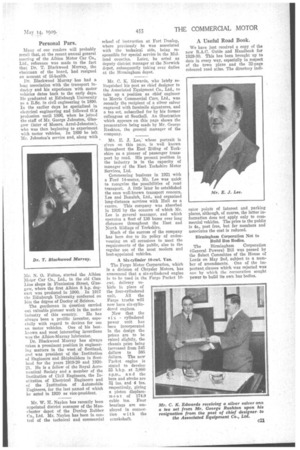Personal Pars.
Page 51

If you've noticed an error in this article please click here to report it so we can fix it.
Many of our readers will probably recall that, at the recent annual general meeting of the Albion Motor Car Co., Ltd., reference was made to the fact that Dr. T. Blackwood Murray, the chairman of the board, had resigned on account of ill-health.
Dr. Blackwood Murray has had a long association with. the transport industry and his experience with motor vehicles dates back to the early days. He graduated at Edinburgh University as a B.Sc. in civil engineering in 1890. In the earlier days he specialized in electrical engineering and followed ths profession until 1896, when he joined the staff of Mr. George Johnston Glasgow (later of Messrs. Arrol-Johnston), who was then beginning to experiment with motor vehicles. In 1899 he left Mr. Johnston's service and, along with Mr. N. 0. Fulton, started the Albion Motor Car Co., Ltd., in the old Clan Line shops in Finnieston Street, Glasgow, where the first Albion 8 h.p. dogcart was produced in 1900. In 1917 the Edinburgh University conferred on him the degree of Doctor of ,Science.
The gentleman in question carried out valuable pioneer work in the motor industry of this country. He has always been a prolific inventor, espedaily with regard to devices for use on motor vehicles. One of his bestknown and most interesting inventions was the Albion-Murray lubricator.
Dr. Blackwood Murray has always taken a prominent position in engineering matters in the west of Scotland, and was president of the Institution of Engineers and Shipbuilders in Scotland for the years 1919-20 and 192021. He is a fellow of the Royal Aeronautical Society and a member of the Institution of Civil Engineers, the Institution of Electrical Engineers and of the Institution of Automobile Engineers, for the last named of which he acted in 1920 as vice-president.
Mr. W. H. Naylon has recently been appointed district manager of the Manchester depot of the Dunlop Rubber Co., Ltd. Mr. Naylon has been in control of the technical and commercial school of instruction at Fort Dunlop, where previously he was associated with the technical side, being responsible for special service in the Midland counties. Later, he acted as deputy district manager at the Norwich depot, subsequently taking over duties at the Birmingham depot.
Mr. C. K. Edwards, who lately relinquished his post as chief designer to the Associated Equipment Co., Ltd., to take up a position as chief engineer to Morris Commercial Cars, Ltd., was recently the recipient of a silver salver engraved with facsimile signatures, and a tea set, subscribed for by his former colleagues at Southall. An illustration which appears on this page shows the presentation being made by Mr. George Rushton, the general manager of the company.
Mr. E. J. Lee, whose portrait is given on this page, is well known throughout the East Riding of Yorkshire as a pioneer of passenger transport by road. His present position in the industry is in the capacity of manager of the East Yorkshire Motor Services, Ltd.
Commencing business in 1921 with a Ford 14-seater, Mr. Lee was quick to recognize the possibilities of road transport. A little later he established the once well-known transport concern, Lee and Beaulah, Ltd., and organized long-distance services with Hull as a centre. This company was absorbed in 1926 by the concern of which Mr. Lee is general manager, and which operates a fleet of 130 buses over long distances throughout the East and North Ridings of Yorkshire.
Much of the success of the company has been due to its policy of endeavouring on all occasions to meet the requirements of the public, also to the regular use of the most modern and best-appointed vehicles.
A Six-cylinder 1O-cwt. Van.
Now that the s i x cylindered power unit has been incorporated in the design the prices are to be raised slightly, the chassis price being increased from 545 dollars to 595 dollars. The new Packet engine is stated to develop 55 b.h.p. at 3,000 r.p.m., an d the bore and stroke are 3i ins. and 4 ins. respectively, giving a piston displacement of 174.9 cubic ins. Four bearings are employed in connection with the crankshaft. A Useful Road Book.
We have just received a copy of the new R.A.C. Guide and Handbook for 1929-30. This has been brought up to date in every way, especially in respect of the town plans and the 32-page coloured road atlas. The directory indi
cotes points of interest and parking places, although, of course, the latter information does not apply only to commercial vehicles. The price to the public is 4s., post free, but for members and associates the cost is reduced.
Birmingham Corporation Not to Build Bus Bodies.
The Birmingham Corporation (General Powers) Bill was passed by the Select Committee of the House of Lords on May 2nd, subject to a number of amendments. One of the important clauses which was rejected was one by which the corporation sought power to build its own bus bodies.




























































































































